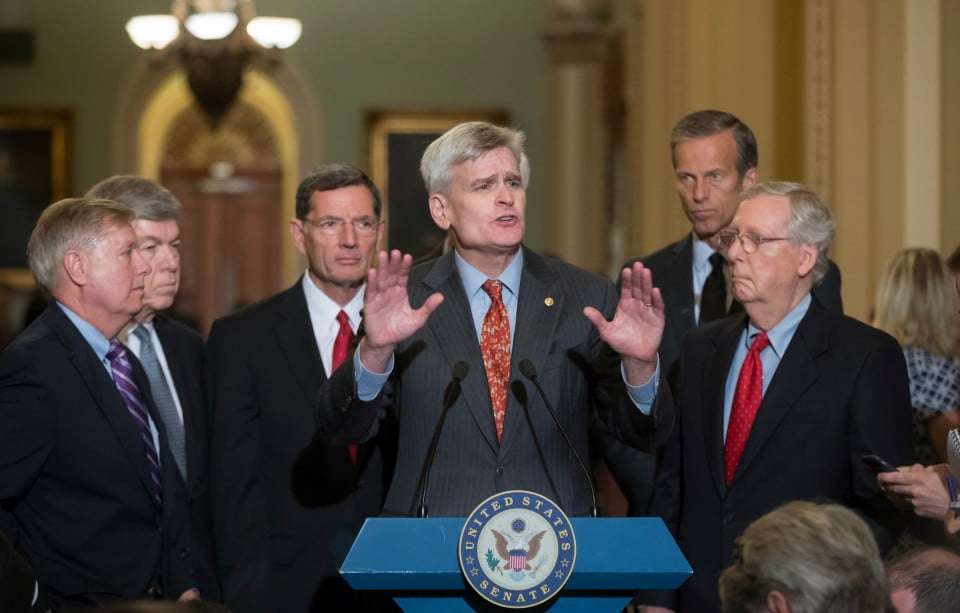Does the Cassidy-Graham health-care bill have constitutional problems?

The Affordable Care Act faced immediate constitutional challenges once it was enacted. If congressional Republicans are able to cobble together enough votes to "repeal and replace" the ACA, their efforts may face similar legal challenges.
Legal commentators have identified at least two potential constitutional problems with the Cassidy-Graham reform bill, which is the current focus of "repeal and replace" efforts in the Senate.
Cornell University law professor Michael C. Dorf argues that one problem with Cassidy-Graham is that it violates the constitutional constraints placed upon conditional spending, in particular the requirement that any conditions or requirements placed upon the receipt of such funding be clear and unambiguous so that states are on notice of the conditions to which they are subject. Dorf explains:
The Graham-Cassidy block grant formula reduces how much money states receive in future years by effectively clawing back money that was previously provided to states that expanded Medicaid.
The clawback is unconstitutional, because it violates the requirement that Congress specify any conditions on federal funds "unambiguously." When states like Alaska, Kentucky, and West Virginia decided to accept federal Medicaid expansion funds they were not told at all-much less told unambiguously-that such acceptance would result in a reduction in their allocation of federal health insurance funding in future years. Graham-Cassidy imposes a retroactive penalty on states that accepted Medicaid expansion funding. . . .
One could try to argue that the Graham-Cassidy clawback is not a condition on federal funding because Congress is under no constitutional obligation to provide any further health insurance funding for states. But that argument would overlook the fundamental logic of the limits on congressional power under the Spending Clause. Congress is never under any constitutional obligation to spend money in any particular way. The Spending Clause cases are themselves conditional. They hold that when Congress does spend money via the states, there are limits on how it may do so. Clarity is one of those limits.
The requirement that Congress state any conditions on federal funding unambiguously is no mere technical nicety. It is a fundamental principle of American federalism. It protects states' sovereign prerogatives. It enables states to make informed judgments about the consequences of accepting federal funds. And few judgments are more consequential to the states than those that affect how much money they will have to meet the needs of their people. A state that was told in 2014 that Medicaid expansion then would cost it tens of millions of dollars in 2020 and thereafter might well have made a different choice.
Perhaps ironically, it was conditional spending arguments against the ACA that had the most success in NFIB v. Sebelius.
A second potential problem with Cassidy-Graham comes from reported efforts to induce reluctant senators to support the bill. In particular, there is the possibility that efforts to carve out exceptions for Alaska may violate the Constitution's uniformity clause. Georgetown University law professor Brian Galle describes the potential problem:
Article I, section 8 of the Constitution says "all Duties, Imposts and Excises shall be uniform throughout the United States." Joseph Story, writing in 1834, thought that the point of that provision was to prevent coalitions of states from ganging up, in Congress, to benefit themselves at the expense of others. While the "uniformity clause" has been watered down over time, it's still enough to swamp the Alaska Purchase proposal.
Under U.S. v. Ptasynski, 462 U.S. 74 (1983), the imposition of different tax burdens in different places is suspect. While the Supreme Court's review is relatively deferential, the clause does require that taxes apply "at the same rate, in all portions of the United States where the subject of the tax is found." "Where Congress does choose to frame a tax in geographic terms," on the other hand, the court "will examine the classification closely to see if there is actual geographic discrimination," to see whether there are "neutral factors" that can justify the geographic distinction.
While I doubt the senators would be so brazen as to expressly include a geography-based exception in the final bill language, a statutory provision clearly motivated by a desire to, in the court's words, "grant . . . an undue preference at the expense of other . . . states" could have problems. As Galle notes, "By this standard, the 'Alaska Purchase' looks like it's in trouble."
The Uniformity Clause is rarely litigated, and it seems like a provision the Court is reluctant to give much life to. There's undoubtedly a fun con law I class discussion to be had about whether Courts should make the kinds of policy judgments an expansive reading of the Clause seems to call for. But the Alaska Purchase seems to fall inside the tiny circle of statutes prohibited by even a minimalist reading of the Clause.
Interestingly enough, in the wake of NFIB, some commentators suggested that the court's opinion actually created a uniformity clause problem for the ACA.
I have not studied the proposed text and operation of the Cassidy-Graham reform bill to know whether either of these claims would (or should) ultimately prevail. But both challenges strike me as serious ones, and each raises the sort of issue that Cassidy-Graham's supporters will need to address - either in the bill itself, or in court filings when the inevitable legal challenges arise.
